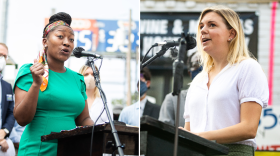The District 5 seat on Austin City Council is up for grabs.
State legislative staffer Ryan Alter and communications adviser Stephanie Bazan bested the crowded field to represent the South Austin district in the November election. But neither candidate garnered more than 50% of the votes, so they're competing in a runoff.
Both candidates attended a forum hosted by KUT and the Austin Monitor in October to share how they would address key issues in Austin if they are elected to office. Here’s where they stand on three major issues.
Not sure if you live in District 5? To see what City Council district you're in, go here. Click “I Want To …" and "Find My Council District” and type in your address.
Project Connect
The sprawling, $10 billion plan to build out two rail lines and expand bus service across the city will hit every district in Austin, development-wise — and it comes after decades of trying and failing to bring rail to Austin.
Capital Metro and the city have put an emphasis on equity-minded development, but the project's price tag has ballooned from an initial $6 billion budget to now a more than $10 billion estimated cost.
Ryan Alter supports Project Connect. He says it's a good start for a longterm transportation plan, but he says the city and CapMetro need to focus on delivering the promised infrastructure on time.
"It's not going to solve our problems overnight," he said. "It was a long time getting here, and it'll be a long time getting out. But I do think we need to really show the public and deliver at least a piece of that really on time and in a high-quality manner."
Stephanie Bazan supports Project Connect. She says she hopes the project will allow for more access to "reliable" and "sustainable" public transportation.
"I think that with Project Connect, it's important that it's implemented equitably, and completed on time and on budget, and that we meet community expectations," she said. "I don't think [transit is] as reliable as we need it to be right now, if you're trying to get to work or something on time."
I-35 expansion
Austin's interstate is a lot of things. The state's third most congested roadway is at any moment a living monument to Austin's growth and a symbol of the city's history of inequity and systemic racism.
For years, the city and Texas itself have struggled to rally around a single vision for the roadway's much-needed upgrade. Now that the rubber's meeting the road on a state-backed plan to revamp the roadway, the road ahead isn't so clear.
Local advocates say the Texas Department of Transportation's plan to expand lanes on the oft-congested interstate will increase traffic and close businesses. TxDOT says it won't pay for plans to cap the roadway (à la Dallas' Klyde Warren Park), which could total upwards of $700 million in city money.
Ryan Alter supports the locally backed, cap-and-stitch plan for I-35. He said, given the fact the city's already on the hook for a multi-billion-dollar, voter-backed Project Connect plan, I-35's future design should work in tandem with its goals of being multimodal (transportation-speak for something that accommodates more than just cars) and cuts down on carbon emissions.
"We need them to work hand in hand, and for it to actually support multimodal transportation," Alter said. "And so have whatever we build along 35 allow for our multimodal options to lower emissions for our region."
Stephanie Bazan argues the plan to widen I-35 will only compound the congestion. She, too, wants the planned revamp of the roadway to lead to fewer carbon emissions. She pushes back against the idea that the roadway exists solely as a facilitator of commerce. Bazan says the project could also better connect the city's east and west sides that, historically, have been harshly split by the interstate.
"I think that it's a really big problem for us trying to reach our climate goals," Bazan said. "It also will affect small businesses and other people who are along 35. If we're adding more lanes, though, I would tend to be for no wider, no higher."
Austin Police Department
The Austin City Council's 2020 decision to cut and reallocate the department's budget after the police killings of George Floyd and Mike Ramos drew scrutiny from state and local advocates.
It's a decision that's had a chilling effect on the department's recruitment efforts and one that's laid bare the tensions between the Austin Police Department and the Austin City Council.
Ryan Alter argues the vacancies on the city's police force have led to gaps in service — namely with the department's ability to respond to mental health-related calls. That's been a historic deficiency in the department's training and service, but one that's been compounded by a recent shortage of 911 responders.
"Part of it is the relationship or really lack thereof right now between council and APD," Alter said. "I think it also comes from just what we're asking of police officers right now. We're asking them to be social workers and mental health professionals."
Stephanie Bazan emphasizes the need for better mental health response on the part of officers, but adds that APD's officers also need to live in the communities they're serving.
"I think that as far as recruiting goes, we do need to work together to fill those vacancies and make sure that we have more officers who represent the people in the city that they're serving," she said.
You can watch the entire pre-runoff District 5 debate hosted by KUT and the Austin Monitor below. Early voting has begun and runs through Dec. 9.
Election Day for runoffs is Dec. 13.















